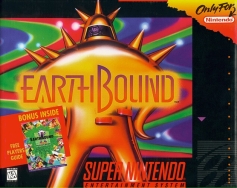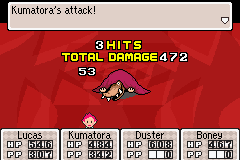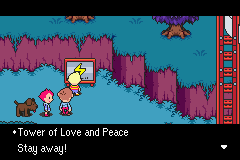Recently, a group of dedicated fans completed a two-year-long project to translate the Game Boy Advance title MOTHER 3, the Japanese sequel to Earthbound, into English. After thousands of grueling hours of translation and hacking, the team emerged victorious to the loving sobs of fans everywhere. Ars had a chance to speak with three members of the translation team, including team lead Tomato and two of his colleagues, Reid and Byuu. Here's what they had to say about the project.
Ars: Tell us briefly about Mother 3 and what the game means for Western gamers.
Reid: MOTHER 3 is the sequel to EarthBound, an old SNES RPG which came out in 1995. EarthBound was a caricature of American pop culture—calm suburbs terrorized by UFO's and aliens, Mr. T lookalikes, constant music references to bands like the Beatles, the Doors, and David Bowie, evil robots right out of 1950's sci-fi flicks, zombies... the list goes on.
 MOTHER 3's advertising slogan, on the other hand, is "strange, funny, and heartrending," and it really hits on all three cylinders. The game is more serious and focused on storytelling, and its themes are surprisingly complex. That's not to say that it takes itself too seriously, though, as the humor that made EarthBound great is still there in spades. There aren't a lot of other games that can spark earnest debate on Marxism (hello, Bioshock fans!), consumer culture, and the relativity of evil, all while maintaining a self-effacing sense of humor.
MOTHER 3's advertising slogan, on the other hand, is "strange, funny, and heartrending," and it really hits on all three cylinders. The game is more serious and focused on storytelling, and its themes are surprisingly complex. That's not to say that it takes itself too seriously, though, as the humor that made EarthBound great is still there in spades. There aren't a lot of other games that can spark earnest debate on Marxism (hello, Bioshock fans!), consumer culture, and the relativity of evil, all while maintaining a self-effacing sense of humor.
Ars: Why so much work for an unreleased MOTHER title?
Reid: At the risk of sounding like a wild-eyed otaku, the series is brilliant. The care and thought that Shigesato Itoi (the creator) puts into his work is stunning, and it would be a genuine nerd-tragedy if one of his greatest accomplishments was forever stuck in Japan.
It's also important to understand our history as fans. We've been waiting for this game through 13 years of delays, downgrades, and cancellations. We've organized countless petitions and events in support of the MOTHER series, and despite the attention and support we've received from the gaming community, Nintendo has consistently ignored us.
The petitions are a good example of our efforts. Instead of just collecting signatures with petitiononline, we developed our own software and put our staff to work checking every signature. Our final attempt, the MOTHER 3 petition, gathered 31,000 signatures—that's 819 pages, 3 columns per page, 6pt font, not including the 1,200 handwritten signatures we got from all over the world. We printed out a couple copies, bound them, and shipped them to NCL (Japan) and NoA alongside an album full of artwork. That was the last we heard of it.
In the beginning, our petitions were filled with demands like "please release MOTHER 1 on the Game Boy Color!" (not unrealistic considering that the game was fully localized but never released), but eventually we stopped making demands and simply said "all of us love the MOTHER series, please do something with it."
MOTHER 3 eventually became a kind of rallying point for us. It sounds melodramatic, but it's true that this translation was as much about the fans as it was about the game.
Ars: How did the project begin?
Reid: MOTHER 3 was released in Japan in April 2006. We held our breath for a few months, but we didn't have high hopes for an official localization. By August we had gotten word through the grapevine that Nintendo had passed it up, and in November that was pretty well confirmed during an interview with an employee of NoA's 'Treehouse' localization team. A few days later we posted our announcement at http://starmen.net/devotion.
Ars: What exactly was involved in the project?
Reid: There were two main components to the localization: the translation and the hacking, both of which turned out to be pretty daunting tasks. There are nearly 1000 pages of text in the game when you add it all up—a lot, even by RPG standards. If we were paying someone to translate the text, it would have been incredibly expensive, maybe in the ballpark of $30,000. Lucky for us, Tomato is not only a professional, but he's a freelancer, too. He gave up most of his free time (and sleep) over the past two years to work on MOTHER 3.
Compared to the hacking, though, the translation almost seemed like a walk in the park.
Ars: Get technical for us. What are the mechanics involved in doing this kind of hack? What kind of software was used? What kind of programming did the team have to do?
Reid: When it comes to ROM hacking, everything is in assembly. For the uninitiated, localizing a Japanese ROM at the assembly level is like trying to teach someone to speak another language by tweaking bits of their DNA—a slow and grueling process, full of trial and error.
The team incorporated dozens of different kinds of hacks. Most of them were related to VWF (variable width fonts) because, in Japanese, each letter takes up the same amount of space on the screen. In English, however, mono-spaced letters are ugly and can be very difficult to read, so the team had to write and insert their own text display routines to jam the letters together.
 Tomato: The biggest problem was that the developers designed each 'system' (menu, battle, main text) in such a strange, rigid way that there simply wasn't enough space in memory to allow for enough text on the screen at once. If you remember those videos and screenshots of screeching bugs that we posted on the blog, you saw what can happen. We basically had to rewrite every display routine every step of the way, pretty much from scratch. No text display routine wound up untouched, and there were probably 10-20 different ones at least. So while dealing with all the different VWFs was annoying, those hacks were pointless until we went in and actually allowed for more text to be displayed at once.
Tomato: The biggest problem was that the developers designed each 'system' (menu, battle, main text) in such a strange, rigid way that there simply wasn't enough space in memory to allow for enough text on the screen at once. If you remember those videos and screenshots of screeching bugs that we posted on the blog, you saw what can happen. We basically had to rewrite every display routine every step of the way, pretty much from scratch. No text display routine wound up untouched, and there were probably 10-20 different ones at least. So while dealing with all the different VWFs was annoying, those hacks were pointless until we went in and actually allowed for more text to be displayed at once.
Reid: Aside from the text, there were also a lot of graphics hacks. The team inserted an intro screen (which is the only obvious "change" they made to the ROM) and swapped out a handful of graphics to maintain continuity with EarthBound.
Aside from the hacks which actually went into the game itself, there was a significant amount of coding that went into miscellaneous software tools. Some were built from scratch, and some were tweaked to suit the team's purposes. For example, byuu made some changes to his xkas cross-assembler, while Tomato, Jeffman, sblur, byuu, Klarth, Gideon Zhi, and a couple of other guys all worked together to make script dumping/insertion tools, patches, and other development-related programs.
Ars: Tell us about the project team. How many people have worked on the translation? How many man hours would you estimate were sunk into the project? How did the team cut out time to work on this for-free labor of love?
Reid: In the end, the patch was the result of contributions from roughly a dozen different hackers and translators, most of them well-known for their work on other popular fan translations. Tomato's past contributions to the ROM hacking scene made it pretty easy to find help when it was needed.
Tomato definitely spent well over a thousand hours on the project, and Jeffman probably got close to (or surpassed) that milestone too. Nobody really tracked their time, but even team members who made relatively "small" contributions put in 50-100 hours of work.
Ars: Did you at any point consider opening the project to the public in an attempt to crowd-source the translation?
Reid: Nope. Tomato, like Itoi, is a perfectionist, so he knew that getting too many other people involved in the process would just slow things down. He did, however, crowd-source some of the more granular aspects of the translation. For example, a lot of the enemies in the game have clever puns for names, and the more brains you have working on a problem like that, the better.
Ars: How dense was the language? Can you offer any examples of difficult areas in the translation?
Reid: At one point in the game, there was a pair of mice who spoke in a weird dialect of Japanese. In keeping with the spirit of the original, Tomato decided to have them speak in a thick/unusual English dialect. After speaking with the team and the community, someone came up with a really obtuse cockney 'translation' of the dialogue which seemed to work well.
Ars: Were there any gray areas in the translation? Can you think of any parts where the team had to make a conscious decision that may not have been perfectly faithful to the original text?
Reid: That's a pretty normal part of any localization. For example, one of the more 'controversial' changes was switching the name of a character known as 'Yokuba' (a play on the Japanese term for 'greed') to 'Fassad.' Aside from the subtle wordplay ("facade"), the new name more closely matches the character's style and also means 'corruption' in Arabic. It works on a lot of levels, whereas Yokuba didn't really make sense to anyone who wasn't Japanese. That didn't keep people from complaining, but hey, you can't win them all.
Ars: We heard that some changes were made to the ROM via the patch beyond just the translation, such as the addition of more credits to the end of the game? Tell us about that.
Tomato: We didn't alter the credits. One, it would seem less professional, and two, there were technical reasons for it, and to put us in, we'd have to take existing credits out or squish existing credits together, which is also not ideal. Besides, we have the website URL at the intro screen and our names in the readme/online readme.
Reid: There were, however, lots of changes that the team felt Nintendo would have made to maintain continuity with EarthBound. For example, when MOTHER 2 was localized, Nintendo replaced an octopus statue with a pencil statue, because the octopus pun was totally lost on English-speaking audiences. That statue showed up again in MOTHER 3, so it had to be changed. There's a comprehensive list of these changes at http://mother3.fobby.net/or/.
Ars: Did you encounter any resistance from Nintendo as the project was underway? Certainly at some point the project hit the media and surely drew attention.
 Reid: Nintendo definitely knew about the project. We're not real comfortable discussing the details, but word of the project reached the highest levels of the company (at least at NoA). For whatever reason, they never interfered. Even now, we don't know if that makes us happy or sad, because we made it very clear that we would end the project immediately if they made any kind of announcement about their plans for the game's future.
Reid: Nintendo definitely knew about the project. We're not real comfortable discussing the details, but word of the project reached the highest levels of the company (at least at NoA). For whatever reason, they never interfered. Even now, we don't know if that makes us happy or sad, because we made it very clear that we would end the project immediately if they made any kind of announcement about their plans for the game's future.
We don't want to come across as an angry group of vigilantes. We dislike piracy and encourage everyone to import the game. Since it's very difficult to get ahold of (most import shops stopped carrying it earlier this year) we also encourage fans to purchase official merchandise. Not because buying a shirt makes it 'right', but because the goal is to support the people who created this game.
Ars: Do you think that someday projects like this could pave the way for a more open standard of game text? Will games ever end up like popular animes and foreign films, with something similar to the subtitle support we see in so many players today?
byuu: Definitely not in the commercial space. If anything, it might make things worse. Developers may be keener to add protections to prevent outside parties from modifying their scripts. That gives companies the ability to wait as long as they want before localizing a game, and maximizes the audience for that. Of course, it could be argued that the fan translations create a larger market for the game overseas... but company lawyers generally don't think like that.
Ars: Once the entire game was translated and the hard-working team got to sit down and play it, how did they like it? What was it like playing through a game they became so attached to?
Tomato: I think in maybe five years I'll be able to sit down and enjoy our work, but for now it's all too well-memorized. I have every line down by heart, even what each line used to be before editing. It's kind of killed the enjoyment, but I probably get more enjoyment out of seeing others play and enjoy the game, in some strange vicarious way. But I guess that's how it probably is with most creators of anything.
Ars would like to thank the MOTHER 3 translation team for their time. Players wanting to learn more about their work can visit their official website and development blog.
reader comments